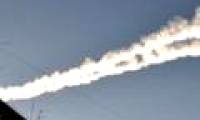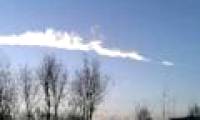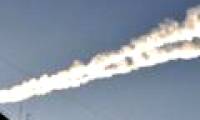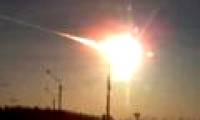
Thanks to radar technology, an asteroid crater has been exposed at the bottom of Lake Chebarkul, after experts attempted to find a meteorite collision point in Russia with the

The meteorite exploded in the Russian sky last month more likely to split from an asteroid and collided with another celestial body tens of millions of years ago.

An asteroid caught fire and exploded violently, dragging shocks and glare in the sky of central Russia, breaking many glass doors and injuring hundreds.

Meteorite collectors are coming to Russia's Chelyabinsk area to search for meteorite fragments after a large object exploded in the sky on February 15.

A US senator commented that the US government invested a lot of money in the program to track objects near the earth, but their devices still could not detect meteorites falling on

Divers have just finished checking Lake Chebarkul, where a meteorite is thought to fall and create a giant crater on the ice, but no trace is found.

Russia's deputy prime minister Dmitry Rogozin said yesterday he supported the call for the establishment of a system capable of preventing threats from space outside the globe.

Many large and small devastations by meteorites have occurred throughout the history of tens of billion years of Earth existence. Many countermeasures have also been studied.

Russian scientists have found the largest meteorite to date in the meteorite fall in Ural on February 15.
 Thanks to radar technology, an asteroid crater has been exposed at the bottom of Lake Chebarkul, after experts attempted to find a meteorite collision point in Russia with the
Thanks to radar technology, an asteroid crater has been exposed at the bottom of Lake Chebarkul, after experts attempted to find a meteorite collision point in Russia with the The meteorite exploded in the Russian sky last month more likely to split from an asteroid and collided with another celestial body tens of millions of years ago.
The meteorite exploded in the Russian sky last month more likely to split from an asteroid and collided with another celestial body tens of millions of years ago. An asteroid caught fire and exploded violently, dragging shocks and glare in the sky of central Russia, breaking many glass doors and injuring hundreds.
An asteroid caught fire and exploded violently, dragging shocks and glare in the sky of central Russia, breaking many glass doors and injuring hundreds. Meteorite collectors are coming to Russia's Chelyabinsk area to search for meteorite fragments after a large object exploded in the sky on February 15.
Meteorite collectors are coming to Russia's Chelyabinsk area to search for meteorite fragments after a large object exploded in the sky on February 15. A US senator commented that the US government invested a lot of money in the program to track objects near the earth, but their devices still could not detect meteorites falling on
A US senator commented that the US government invested a lot of money in the program to track objects near the earth, but their devices still could not detect meteorites falling on Divers have just finished checking Lake Chebarkul, where a meteorite is thought to fall and create a giant crater on the ice, but no trace is found.
Divers have just finished checking Lake Chebarkul, where a meteorite is thought to fall and create a giant crater on the ice, but no trace is found. Russia's deputy prime minister Dmitry Rogozin said yesterday he supported the call for the establishment of a system capable of preventing threats from space outside the globe.
Russia's deputy prime minister Dmitry Rogozin said yesterday he supported the call for the establishment of a system capable of preventing threats from space outside the globe. Many large and small devastations by meteorites have occurred throughout the history of tens of billion years of Earth existence. Many countermeasures have also been studied.
Many large and small devastations by meteorites have occurred throughout the history of tens of billion years of Earth existence. Many countermeasures have also been studied. Russian scientists have found the largest meteorite to date in the meteorite fall in Ural on February 15.
Russian scientists have found the largest meteorite to date in the meteorite fall in Ural on February 15.




 NASA's 'Ninth Planet' Shows Signs of Being Friendly to Life
NASA's 'Ninth Planet' Shows Signs of Being Friendly to Life Why did American astronauts have to be quarantined when returning to Earth?
Why did American astronauts have to be quarantined when returning to Earth? China surprises the world by building a cable-stayed bridge 'above the clouds'
China surprises the world by building a cable-stayed bridge 'above the clouds' Why do women sleep less and wake up more than men?
Why do women sleep less and wake up more than men? Revealing the secret inside the stuffed animal claw machine, from there, summarizing experience to help you increase your winning rate many times over
Revealing the secret inside the stuffed animal claw machine, from there, summarizing experience to help you increase your winning rate many times over What would happen if you dug a hole through the Earth and jumped in?
What would happen if you dug a hole through the Earth and jumped in? Camera takes a photo that lasts 1,000 years
Camera takes a photo that lasts 1,000 years Was there nuclear war in ancient times?
Was there nuclear war in ancient times?